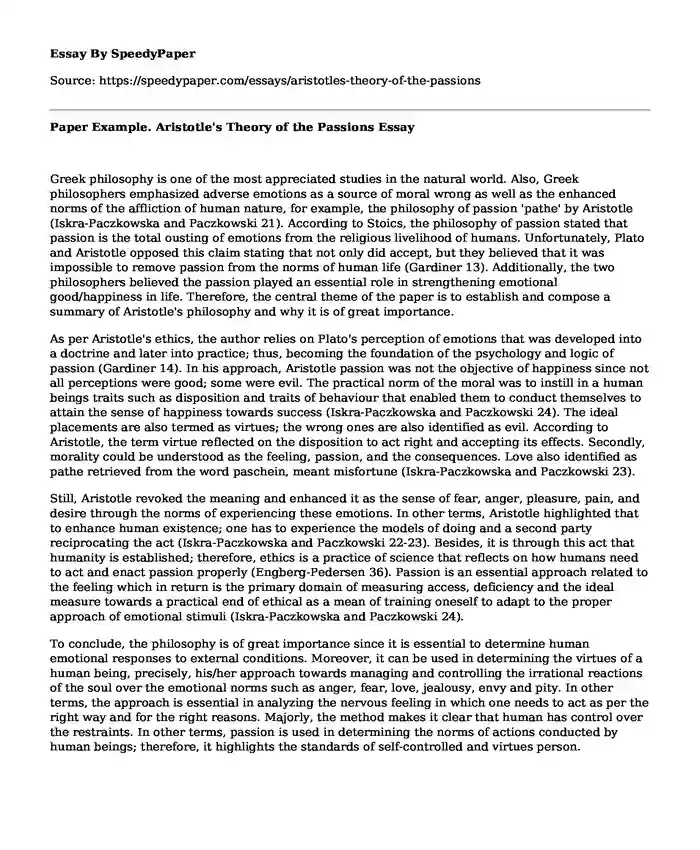
| Type of paper: | Essay |
| Categories: | Philosophers Human behavior Emotional intelligence |
| Pages: | 3 |
| Wordcount: | 613 words |
Greek philosophy is one of the most appreciated studies in the natural world. Also, Greek philosophers emphasized adverse emotions as a source of moral wrong as well as the enhanced norms of the affliction of human nature, for example, the philosophy of passion 'pathe' by Aristotle (Iskra-Paczkowska and Paczkowski 21). According to Stoics, the philosophy of passion stated that passion is the total ousting of emotions from the religious livelihood of humans. Unfortunately, Plato and Aristotle opposed this claim stating that not only did accept, but they believed that it was impossible to remove passion from the norms of human life (Gardiner 13). Additionally, the two philosophers believed the passion played an essential role in strengthening emotional good/happiness in life. Therefore, the central theme of the paper is to establish and compose a summary of Aristotle's philosophy and why it is of great importance.
As per Aristotle's ethics, the author relies on Plato's perception of emotions that was developed into a doctrine and later into practice; thus, becoming the foundation of the psychology and logic of passion (Gardiner 14). In his approach, Aristotle passion was not the objective of happiness since not all perceptions were good; some were evil. The practical norm of the moral was to instill in a human beings traits such as disposition and traits of behaviour that enabled them to conduct themselves to attain the sense of happiness towards success (Iskra-Paczkowska and Paczkowski 24). The ideal placements are also termed as virtues; the wrong ones are also identified as evil. According to Aristotle, the term virtue reflected on the disposition to act right and accepting its effects. Secondly, morality could be understood as the feeling, passion, and the consequences. Love also identified as pathe retrieved from the word paschein, meant misfortune (Iskra-Paczkowska and Paczkowski 23).
Still, Aristotle revoked the meaning and enhanced it as the sense of fear, anger, pleasure, pain, and desire through the norms of experiencing these emotions. In other terms, Aristotle highlighted that to enhance human existence; one has to experience the models of doing and a second party reciprocating the act (Iskra-Paczkowska and Paczkowski 22-23). Besides, it is through this act that humanity is established; therefore, ethics is a practice of science that reflects on how humans need to act and enact passion properly (Engberg-Pedersen 36). Passion is an essential approach related to the feeling which in return is the primary domain of measuring access, deficiency and the ideal measure towards a practical end of ethical as a mean of training oneself to adapt to the proper approach of emotional stimuli (Iskra-Paczkowska and Paczkowski 24).
To conclude, the philosophy is of great importance since it is essential to determine human emotional responses to external conditions. Moreover, it can be used in determining the virtues of a human being, precisely, his/her approach towards managing and controlling the irrational reactions of the soul over the emotional norms such as anger, fear, love, jealousy, envy and pity. In other terms, the approach is essential in analyzing the nervous feeling in which one needs to act as per the right way and for the right reasons. Majorly, the method makes it clear that human has control over the restraints. In other terms, passion is used in determining the norms of actions conducted by human beings; therefore, it highlights the standards of self-controlled and virtues person.
Works Cited
Engberg-Pedersen, Troels. Aristotle's theory of moral insight. Oxford, United Kingdom: Clarendon Press, 1983.
Gardiner, H. N. "The Psychology of the Affections in Plato and Aristotle." Duke University Press on behalf of Philosophical ReviewDuke University Press on behalf of Philosophical Review, 1919, pp. 1-26.
Iskra-Paczkowska, Agnieszka and Przemyslaw Paczkowski. "Ancient doctrines of passions: Plato and Aristotle." Studia Humana, 2016, pp. 21-28.
Cite this page
Paper Example. Aristotle's Theory of the Passions. (2023, Mar 17). Retrieved from https://speedypaper.com/essays/aristotles-theory-of-the-passions
Request Removal
If you are the original author of this essay and no longer wish to have it published on the SpeedyPaper website, please click below to request its removal:
- The Threat and Opportunity of Cyber Insecurity - Essay Sample
- Free Essay on Media Violence: Does Media Violence Cause Violent Behavior?
- Research Proposal Evaluation Paper Sample
- Essay Sample on Global Trends of Migrant Workers
- Essay Sample on Stuart Hall's Theory of Media - Encoding/Decoding
- Free Essay on The Importance of Academic Excellence for Students
- The FBI Cooperations - Paper Sample
Popular categories




